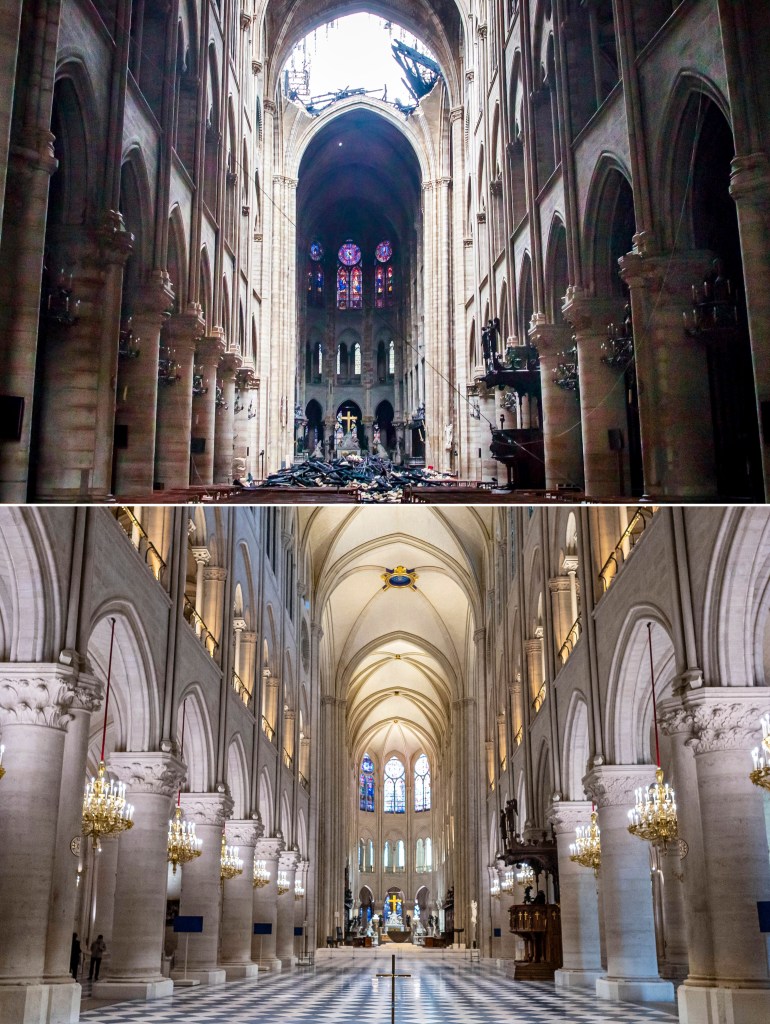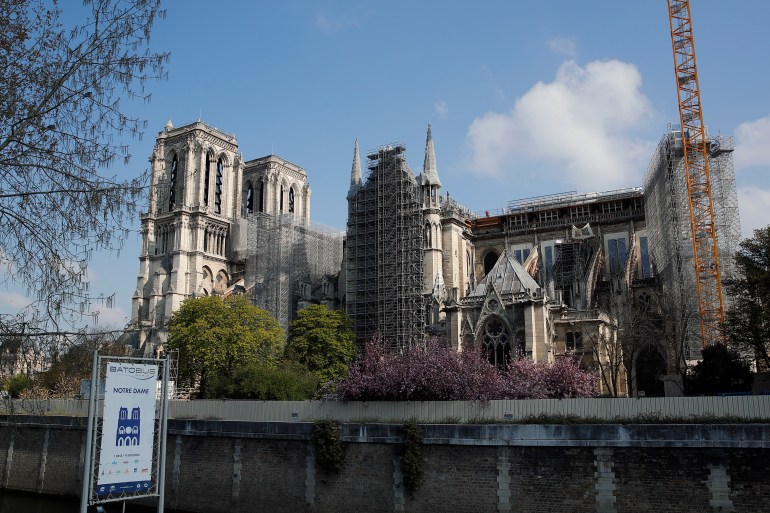Notre-Dame Cathedral, situated on an island in the River Seine in Paris, France, is reopening this weekend after more than five years of intense reconstruction work to restore the medieval building to its former glory.
After a fire gutted the UNESCO World Heritage Site in 2019, the 12th-century Gothic masterpiece has now been masterfully restored and will reopen to the public on Sunday following a ceremony on Saturday, which will be attended by a lineup of heads of state and top-level delegates from around the world.
French President Emmanuel Macron, who promised to restore the cathedral within five years after the catastrophe, made a preopening visit to the site on November 29 with his wife, first lady Brigitte Macron. The president thanked the thousands of workers who had reconstructed the building.
“The inferno of Notre-Dame was a wound for the nation, … and you were its remedy,” the president said.
Here is what we know about this weekend’s reopening and what happened to the nearly 900-year-old cultural icon five years ago:

What caused the fire at Notre-Dame?
The blaze broke out on the evening of April 15, 2019, on the roof of the cathedral. The fire sent tongues of orange flames into the sky as smoke billowed from the building. The fire burned for 15 hours while more than 400 firefighters battled to extinguish it.
It is still unclear what caused the blaze, but authorities suspect an electrical fault or a burning cigarette was the likely culprit. No members of the public were hurt because security officials had sounded the alarm and evacuated the cathedral. However, three security officials were injured.
By the time the fire was extinguished the following day, the inside and roof of the cathedral had been largely destroyed. Its wooden and metal spire, which had been undergoing reconstruction work, collapsed.
Its lead roof melted, and the intricate wooden beams that supported it burned away, leaving a gaping hole over the building.
Some religious relics inside the building as well as exposed artwork on the exterior of the building were badly damaged. However, the vaulted stone ceiling acted as a barrier to the fire and prevented serious damage to the cathedral’s interior stone walls.
The cathedral’s wooden frame was centuries-old, and authorities had long marked it as a possible fire hazard. Still, it was a painful period for the French nation. Toxic lead dust spread and cast a gloom over a solemn Paris. Macron, in an emotional speech on April 17, 2019, promised to restore the monument within five years and make it more beautiful than ever. Notre-Dame did not hold a Christmas Mass that year – for the first time since 1803.
How was the cathedral rebuilt?
Hundreds of donors, including some of France’s richest businesspeople, contributed more than 840 million euros ($889m) to the medieval building’s restoration campaign, which was launched by Macron. About 150 countries, among them the United States and Saudi Arabia, also contributed.
The restoration involved the work of about 2,000 people, including craftspeople, architects and other professionals.
Construction workers used powerful vacuum cleaners and cleaning gels to remove the thickened soot, dust and years of accumulated grime from the lower stone walls of the cathedral. Carpenters then hewed giant oak beams by hand to rebuild the intricate roof frame and the spire. About 2,000 oak trees were felled to provide the wood to rebuild the roof.
Work has not entirely finished, and scaffolding will cover parts of the exterior for a few more years so decorative features on the facade can be fully restored.

When is the reopening ceremony?
Notre-Dame is set to host a high-profile ceremony on Saturday with more than 50 heads of state and government, dignitaries and VIPs attending under tight security.
Notable among them will be US President-elect Donald Trump, who has travelled to Paris on his first foreign trip since winning the November presidential election.
“President Emmanuel Macron has done a wonderful job ensuring that Notre Dame has been restored to its full level of glory, and even more so,” the president-elect said in a post on his Truth Social platform on Monday. “It will be a very special day for all!”
About 170 bishops from France are expected to attend the ceremony although Pope Francis will be notably absent.
Paris Archbishop Laurent Ulrich will strike the cathedral’s closed doors with a staff, formally opening them to commence the ceremony.
The ceremony will proceed in three stages. The great organ, which is France’s largest, will be “awakened”. The organ is made of 8,000 pipes and 115 stops. A series of psalms and prayers, including the Lord’s Prayer, will follow, after which Ulrich will give a final blessing.
The choir will sing Te Deum, a Latin hymn, to round off the service.
When does the cathedral open to the public?
An inaugural Mass for dignitaries will begin at 10:30am (09:30 GMT) on Sunday. Macron is expected to be in the congregation.
The public can then attend a second evening Mass on the same day with tickets which were available on a first-come first-served basis. Guests were able to book tickets, which are free of charge, online.
Special Masses, twice daily, will be held for the next eight days, and many will be open to the public.